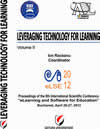ADAPTATION TO LEARNERS’ LEARNING STYLES IN A MULTI-AGENT E-LEARNING SYSTEM
ADAPTATION TO LEARNERS’ LEARNING STYLES IN A MULTI-AGENT E-LEARNING SYSTEM
Author(s): Adina Magda Florea, Pham Quang DungSubject(s): Education
Published by: Carol I National Defence University Publishing House
Keywords: Adaptation; semantic web; ontology; personalized; multi-agent; e-learning system
Summary/Abstract: Adaptation to learners’ learning styles can help education systems improve learning efficiency and effectiveness. This research orientation has been studying by many researchers lately, but most of existing education systems lack of adaptation in which every learner is delivered the same learning contents. Moreover, many researchers concluded that it is worth to apply automatic identification of learning style because of its advantages in precision and time saving. In our study, we concentrate on two main technologies to implement adaptation in education systems that are semantic web and intelligent agent. Using ontology with the Semantic Web services makes it faster and more convenient to query and retrieval educational materials. Intelligent agents can provide the learners with personal assistants to carry out learning activities according to their learning styles and knowledge level. In this paper, we present a domain ontology that is suitable for adaptive e-learning environments. The ontology describes the learning objects that compose a course as well as the learners and their learning styles. We also present a multi-agent e-learning system that supports predefining and re-estimating students’ learning styles during the course for a better personalization. In the system, learning style of each learner can be identified automatically and dynamically. We used a new literature-based method that uses learners’ behaviours on learning objects as indicators for this task. The evaluation showed a high precision in detecting learning styles and in delivering learning materials. Together with the mentioned benefits, this result indicates that our e-learning system is capable for wide use.
Journal: Conference proceedings of »eLearning and Software for Education« (eLSE)
- Issue Year: 8/2012
- Issue No: 02
- Page Range: 259-266
- Page Count: 8
- Language: English

